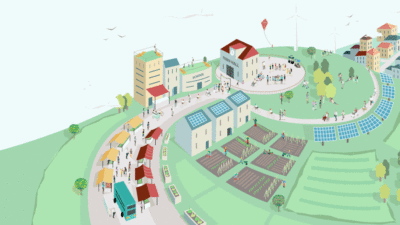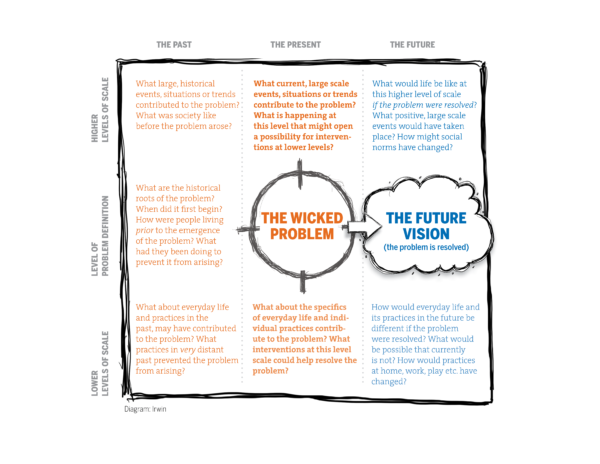LOCAL | By Keila dos Santos
Council Introduces Global Solutions to Small-Town Woes
 To say that Ojai is a “special community” is an idea so well understood that it’s cliché. Unfortunately, despite the “magical vortex” that prevented the city’s outright consummation by the Thomas Fire, Ojai is not immune to economic duress. Issues of water management, declining school enrollments, and the community’s love-hate relationship with tourism present some demands on the small town that seem more appropriate to a larger city.
To say that Ojai is a “special community” is an idea so well understood that it’s cliché. Unfortunately, despite the “magical vortex” that prevented the city’s outright consummation by the Thomas Fire, Ojai is not immune to economic duress. Issues of water management, declining school enrollments, and the community’s love-hate relationship with tourism present some demands on the small town that seem more appropriate to a larger city.
Fortunately, a group of Ojai leaders who have staged an experiment in community development, with the help of some pretty conspicuous characters. Armed with an intent toward collaboration, a little creative thinking, and the stick-to-it-ness that defines entrepreneurial characters, the Ojai City Council was presented a new way of looking at old problems.
The Outsiders
 A few weeks ago, a couple of facilitators from Carnegie Mellon School of Transition Design came out to Ojai. The facilitators offered a framework to a small test group for resolving some of the community’s most pressing challenges called “transition design.”
A few weeks ago, a couple of facilitators from Carnegie Mellon School of Transition Design came out to Ojai. The facilitators offered a framework to a small test group for resolving some of the community’s most pressing challenges called “transition design.”
The school of Transition Design is model of community development that focuses on activating local support to facilitate sustainable, meaningful change. Specifically, in their own lexicon they define and address “wicked problems” by empowering the community to work within challenging economic systems.
A wicked problem is a social or cultural problem that is difficult or impossible to solve for as many as four reasons: incomplete or contradictory knowledge, the number of people and opinions involved, the large economic burden, and the interconnected nature of these problems with other problems.
Facilitation by Carnegie Mellon would be one piece in a course that Ojai must chart for themselves. But it could be an important piece. Since the idea is systematic, locally inclusive, and transformational community development, the process will undoubtedly unfold slowly. The consensus is that the largest barrier will be acceptance by the Ojai Valley Community.
Ojai’s Wicked Problems
Confirmed in a vivid public statement by Scott Eicher, the recently resigned CEO of Ojai’s Chamber of Commerce last month, Ojai has endured the same “wicked problems” on a cyclical basis for decades. He noted the issues of water, traffic, and tourism. An excellent example of this is the STR (Short Term Rental) debate, (a facet in the “tourism” conversation) which will face its seventh public hearing June 12th, in the chambers of the Ventura County Board of Supervisors.
The question becomes, how do we stop having conversations that stand only to “pass the buck” and actually resolve the eternal debates around: Water, Housing, Tourism, Global Warming, Representative Leadership, Economic Sustainability, Declining School enrollment, An Aging Population, and a litany of complex social challenges?
A Future of Possibilities
With each of these problems, a future of possibility lies before us … but only if we engage with it intentionally. It’s time to make some practical, but heart-centered decisions about the realistic, next steps for our small town; steps that could make all the difference. If we don’t do it now, we might not get another chance to try.
At Tuesday night’s City Council meeting, local residents came out to offer their support and ideas about how this would benefit the community. Tod Cossairt from the Ojai Valley Green Coalition said of Transition Design that it was a “community process collaboratively envisioning a climate resilient Ojai. We’ve been studying their approaches already, as an educator of systems theory and you get what you put into it…but the model looks like the city we would like to have.” Planning Commissioner Kathy Nolan, “with this model, the solutions are coming from Ojai.”
Representatives offered their ideas about what this engagement could look like. The measure is expected to pass at the next meeting on June 12th, 2018. Upon receiving this news, Carnegie Mellon will be empowered to seek out grant opportunities that will supplement specific engagements that the Ojai Community decides on, going forward.

Leave A Comment